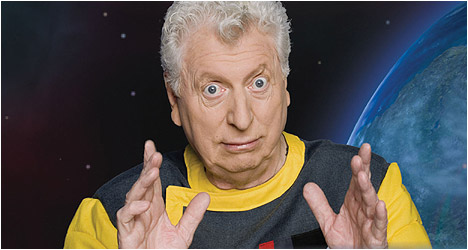Like the rest of Doctor Who fandom, I was gutted — the Britishism sums it up as nothing on this side of the pond quite does — by the sudden death of Elisabeth Sladen at the age of 63. I’ve watched Doctor Who pretty regularly since the mid-eighties, and while my estimation of various Doctors, writers and producers waxed and waned, my admiration for Sarah Jane Smith only grew. Brave, loyal, intelligent, unpretentious and really quite pretty, she made for a perfect geek crush, which later morphed into a sincere and growing admiration for the extraordinary unsung actress who brought her to life.
I once wrote an essay on The Doctor’s female companions for a now-defunct website, and this is what I had to say on the subject of Sarah Jane Smith.
First things first: there were in a sense only two companions in Tom Baker’s era: Sarah Jane Smith and everybody else. Originally conceived as a one-dimensional foil for the chauvinist Third Doctor, Sarah Jane began life as a flinty feminist go-getter, Mary Richards with a small helping of attitude. Once Baker began to hit his stride, she lost much of that edge, but what she gained was far more important and interesting. The Fourth Doctor and Sarah Jane took the mentor/acolyte dynamic established over the previous decade and turned it on its head. Despite — or because of — all the Fourth Doctor’s brilliance, he seemed frequently unable to fully occupy a given situation: he snapped at the people he sought to help, ignored their questions or answered them with callous jokes, or simply gazed off into the ether. It was Sarah Jane who provided the emotional context for the Doctor’s journeys: yes, her presence seemed to say, we are here to help, and it will be all right.
A character is only as great as the actor who plays her, and Elisabeth Sladen made Sarah Jane into far more than what appeared on the page. She invested every moment with a deceptively simple, human believability, and thus remade the character into a common yet fully realized person, quite possibly the most well-rounded character Doctor Who ever had. Her mix of decency, intelligence, and heart gave Baker the freedom to make the Doctor as remote and alien as he dared, and to depend more and more on Sarah Jane in the process. “I worry about you,†she chides him in “The Hand of Fear,†and the beauty of the scene is its truth: The Doctor really is a little helpless without her, and he knows it. Baker himself seemed quite devoted to Sladen, professionally if nothing else: much of his performance was tuned to their chemistry and he dreaded her departure from the show. Indeed, following Sladen’s farewell in “Hand of Fear,†Baker pressed the production team to let the Doctor travel solo; it was as if he knew the ideal balance of the Doctor and Sarah could never be duplicated, and that even to try would be futile.
* * *
Little wonder, when all’s said and done, why Lis Sladen’s Sarah Jane Smith still retains her Best Companion trophy all these years later (though Ace’s rapport with the Seventh Doctor makes her a close runner-up). The role of the companion, after all, is to stand in for all us humans watching the show, and Sladen worked her ass off to make Sarah Jane the most accessible, likeable, and interesting human being she could. For all her successors’ talents, they lacked either the scripts or the personality to bring out the best in insecure Tom Baker.
Until we meet again, Sarah.
I never imagined when I wrote that piece that Doctor Who would come back as spectacularly as it has. I certainly never imagined that Sarah Jane and I would, as it were, meet again, let alone with such bittersweet feeling; “School Reunion” is a lump-in-the-throat episode for any fan of the original series. And despite all the drama and heartache that came with Rose Tyler, Martha Jones and their successors, Sarah Jane’s bond with the Fourth Doctor — with all the Doctors — remains pitch-perfect. Some things really are worth getting your heart broken for.
